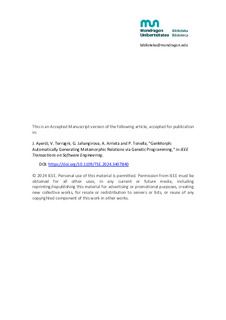| dc.contributor.author | Ayerdi, Jon | |
| dc.contributor.author | Arrieta, Aitor | |
| dc.contributor.other | Terragni, Valerio | |
| dc.contributor.other | Jahangirova, Gunel | |
| dc.contributor.other | Tonella, Paolo | |
| dc.date.accessioned | 2024-06-12T09:04:15Z | |
| dc.date.available | 2024-06-12T09:04:15Z | |
| dc.date.issued | 2024 | |
| dc.identifier.issn | 1939-3520 | en |
| dc.identifier.other | https://katalogoa.mondragon.edu/janium-bin/janium_login_opac.pl?find&ficha_no=177531 | en |
| dc.identifier.uri | https://hdl.handle.net/20.500.11984/6527 | |
| dc.description.abstract | Metamorphic testing is a popular approach that aims to alleviate the oracle problem in software testing. At the core of this approach are Metamorphic Relations (MRs), specifying properties that hold among multiple test inputs and corresponding outputs. Deriving MRs is mostly a manual activity, since their automated generation is a challenging and largely unexplored problem. This paper presents GenMorph , a technique to automatically generate MRs for Java methods that involve inputs and outputs that are boolean, numerical, or ordered sequences. GenMorph uses an evolutionary algorithm to search for effective test oracles, i.e., oracles that trigger no false alarms and expose software faults in the method under test. The proposed search algorithm is guided by two fitness functions that measure the number of false alarms and the number of missed faults for the generated MRs. Our results show that GenMorph generates effective MRs for 18 out of 23 methods (mutation score >20%). Furthermore, it can increase Randoop ’s fault detection capability in 7 out of 23 methods, and Evosuite ’s in 14 out of 23 methods. When compared with AUTOMR, a state-of-the-art MR generator, GenMorph also outperformed its fault detection capability in 9 out of 10 methods. | en |
| dc.language.iso | eng | en |
| dc.publisher | IEEE | en |
| dc.rights | © 2024 IEEE | en |
| dc.subject | Metamorphic Testing | en |
| dc.subject | oracle improvement | en |
| dc.subject | genetic programming | en |
| dc.subject | mutation analysis | en |
| dc.subject | ODS 9 Industria, innovación e infraestructura | es |
| dc.title | GenMorph: Automatically Generating Metamorphic Relations via Genetic Programming | en |
| dc.type | http://purl.org/coar/resource_type/c_6501 | |
| dcterms.accessRights | http://purl.org/coar/access_right/c_abf2 | en |
| dcterms.source | IEEE Transactions on Software Engineering | en |
| local.contributor.group | Ingeniería del software y sistemas | es |
| local.description.peerreviewed | true | en |
| local.identifier.doi | https://doi.org/10.1109/TSE.2024.3407840 | en |
| local.contributor.otherinstitution | https://ror.org/03b94tp07 | en |
| local.contributor.otherinstitution | https://ror.org/0220mzb33 | en |
| local.contributor.otherinstitution | https://ror.org/03c4atk17 | en |
| oaire.format.mimetype | application/pdf | en |
| oaire.file | $DSPACE\assetstore | en |
| oaire.resourceType | http://purl.org/coar/resource_type/c_6501 | en |
| oaire.version | http://purl.org/coar/version/c_ab4af688f83e57aa | en |
| oaire.funderName | Gobierno Vasco | en |
| oaire.funderName | Gobierno Vasco | en |
| oaire.funderIdentifier | https://ror.org/00pz2fp31 / http://data.crossref.org/fundingdata/funder/10.13039/501100003086 | en |
| oaire.funderIdentifier | https://ror.org/00pz2fp31 / http://data.crossref.org/fundingdata/funder/10.13039/501100003086 | en |
| oaire.fundingStream | Elkartek 2022 | en |
| oaire.fundingStream | Ikertalde Convocatoria 2022-2023 | en |
| oaire.awardNumber | KK-2022/00119 | en |
| oaire.awardNumber | IT1519-22 | en |
| oaire.awardTitle | Edge Technologies for Industrial Distributed AI Applications (EGIA) | en |
| oaire.awardTitle | Ingeniería de Software y Sistemas | en |
| oaire.awardURI | Sin información | en |
| oaire.awardURI | Sin información | en |







